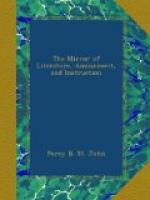and useful in proportion as the offender feels he
deserves it, and is conscious of having only his quantum
meritus.. This the convict can now never feel,
seeing his companion in crime let off for a few months’
imprisonment, he (his companion) having been guilty
of an offence equal to his own, and for which he (the
convict) is transported for life. Those connected
with the court, in the conversations I have had with
them, say, “circumstances of character occasion
the apparent anomalies;” being unable, or perhaps
unwilling, to give a better. That a good character
does not avail the prisoner, or direct the court in
its judgments, may be seen by a mere inspection of
the printed trials, and is better known to all who
have watched the proceedings of this court for any
time. Hundreds of cases might be cited to illustrate
this fact. I remember the case of two butchers,
whose briefs I wrote, which occurred last year.
One was an old, the other a young man, both having
been in the employ of the prosecutor. They were
charged with stealing a breast of mutton from their
master: both were found guilty. The old
man had persons to speak as to his character for honesty
for forty years last past (his former masters); the
young one had not a solitary witness to say a word
for him. The former was sentenced to fourteen
years’ transportation; the latter to six months
in the house of correction. When the prosecutor
heard of the circumstance, he got up a petition to
the secretary of state for a remission of the sentence,
in which he stated that on the trial he himself had
given the old man a good character, and not the other.
Instances of this kind occur out of number to confirm
the rogues in their preconceived notions of the uncertainty
of punishment, and that “the greatest crimes
come off the best.” This is an aphorism
among the thieves. I have seen some of them,
after being sentenced by the court, dance for hours,
calling out continuously, “Did I not tell you
all, the biggest rogues get off the best?” The
scene in the several yards of Newgate on the sentence-days,
after the judgments have been passed, defies any description
on paper. Some will be seen jumping and skipping
about for hours, frenzied with joy at the very unexpectedly
mild sentence passed on them; others are cursing and
swearing, calling down imprecations on the head of
the recorder, for having, as they say, so unfairly
measured out justice; all agreeing there is no proportion
in the punishments to the crimes. It may be said,
it is of little import what these men think, so they
are punished. But is it of no importance under
what impression the others are discharged? If
the discharged feel (as assuredly they do) that punishment
is a matter of chance, they return to their habits
as the hazard-player goes again to the dice, in hopes
of coming off a winner, and reimbursing himself for
former losses. There is another evil comes out
of these unequal sentences. The discontent it
produces on the minds of those who fall under the




